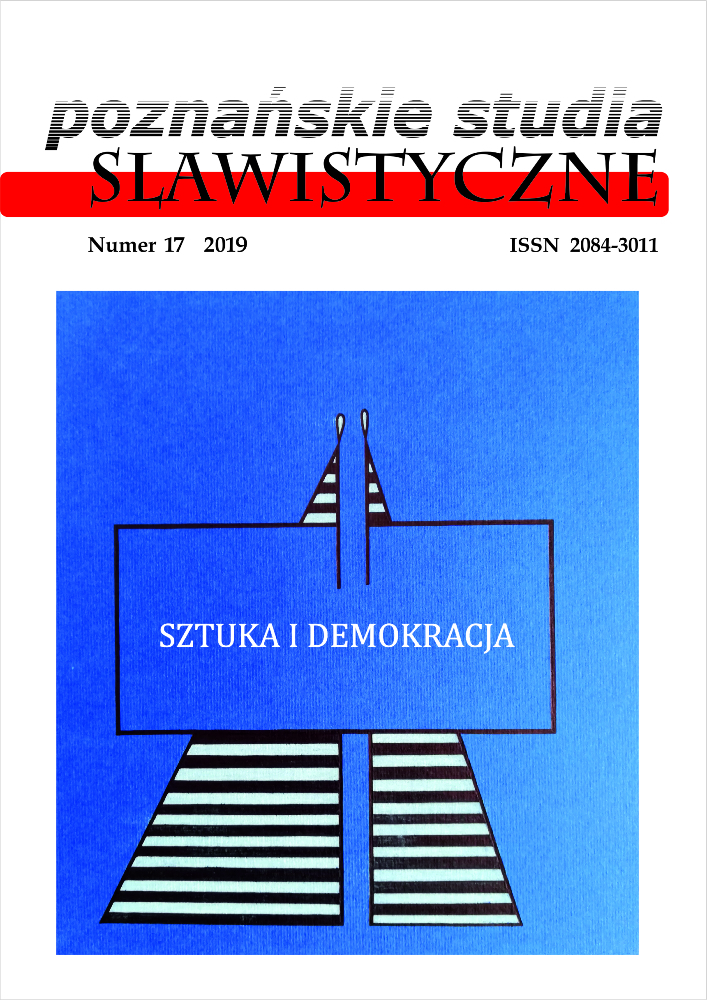Abstrakt
In this paper, I approach to the relationship between the art and the democracy via discussion of two histories of Yugoslav literatures. I propose and try to defend a thesis that both accounts of the history of Yugoslav literatures synchronize temporalities of the different national literatures, reducing thereby differences between them. Both histories substantialize Yugoslav literature as a remnant of the lost community. They argue that immediacy of that community had dissolved into the variety of nations, which led separate lives under the rule of empires. In the name of that mythical past, heterogeneous temporalities are synchronized to the single temporal flow. However, the similar substantializing operation and synchronization is present in the more recent concept of (post)-Yugoslav literature.Bibliografia
Anderson, B. (1983). Imagined Communities. Reflections on the Origin and Spread of Nationalism. Rev. ed. London: Verson.
Balibar, E., Wallerstein, I. (1991). Race, Nation, Class: Ambiguous Identities. Transl. C. Turner. London: Verso.
Barac, A. (1954). Jugoslavenska književnost. Zagreb: Matica hrvatska.
Bauman, Z. (1993). Modernity and Ambivalence. Cambridge: Polity.
Beganović, D. (2014). Jezik, povijest, geografija. Egzil i emigracija u postjugoslavenskim književnostima. "Sarajevske Sveske" br. 45-46.
Beronja, V., Vervaet, S. (eds). (2016). Post-Yugoslav Constellations: Archive, memory and Trauma in Contemporary Bosnian, Croatian, and Serbian Literature and Culture. Berlin: De Gruyter. https://doi.org/10.1515/9783110431575
Bhabha, H. (1994). The Location of Culture. London: Routledge.
Blanuša-Božić, Z. (2010). Nacija bez subjek(a)ta. Kakva je poststrukturalistička koncepcija nacije?. "Filozofska istraživanja" god. 30, sv. 1-2, str. 311-321.
Cheng, V. J. (2018). Amnesia and the Nation History, Forgetting, and James Joyce. New York: Palgrave Macmillan.
Dabo, R. (1975). Pesnik Tin Ujević. "Sodobnost" god. 23, br. 7, str. 605-611.
Devisch, I. (2013). Jean-Luc Nancy and the Question of Community. London: Bloom¬sbury.
Kramarić, Z. (2014). Jugoslavenska ideja u kontekstu postkolonijalne kritike. Zagreb: Meandarmedia.
Langford, M. (2007). Scissors, Paper, Stone: Expressions of Memory in Contemporary Photographic Art. Montreal: McGill-Queen's University Press.
Matijević, T. (2016). National, post-national, transnational. Is post-Yugoslav literature an arguable or promising field of study?. U: Grenzräume - Grenzbewegungen. Eds N. Frieß, G. Lenz, E. Martin. Potsdam: Universitätsverlag Potsdam, str. 101-113.
Martin-Jones, D. (2006). Deleuze, Cinema and National Identity: Narrative Time in National Contexts. Edinburgh: Edinburgh University Press. https://doi.org/10.3366/edinburgh/9780748622443.001.0001
Lukács, G. (1984). Die Theorie des Romans: Ein geschichtsphilosophischer Versuch über die Formen der großen Epik. Darmstadt: Luchterhand.
Mijatović, A. (2017). The Time of Dispossession: The Conflict, Composition and Geophilosophy of Revolution in East Central Europe. U: Claiming the Dispossession: The Politics of Hi/storytelling in Post-imperial Europe. Ed. V. Biti. New York: Brill. str. 50-73. https://doi.org/10.1163/9789004353930_004
Mijatović, A. (2018). Vrijeme, tranzicija i post-jugoslavensko stanje. U: Krajobraz po transformacji. Red. B. Zieliński. Poznań: Wydawnictwo Naukowe UAM, str. 49-63.
Pavletić, V. (1970). Protivljenja. Zagreb: Znanje.
Popović, P. (1918). Jugoslovenska književnost. Cambridge: Cambridge University Press.
Rakočević, R. (2011). Post-jugoslovenska književnost? Ogledala i fantomi. "Sarajevske sveske" br. 35-36, str. 202-210.
Renan, E. (1996). What Is a Nation?. Transl. M. Thom. U: Becoming national: a rea¬der. Ur. G. Eley, R.G. Suny. Oxford: Oxford University Press, str. 42-57.
Suvin, D. (2015). Splendour, Misery, and Possibilities: An X-Ray of Socialist Yugosla¬via. New York: Brill. https://doi.org/10.1163/9789004325210
Silverman, M. (1992). Deconstructing the Nation: Immigration, Racism and Citizens¬hip in Modern France.
Wachtel, A. (2006). The Legacy of Danilo Kiš in Post-Yugoslav Literature. "The Slavic and East European Journal" vol. 50, no. 1, str. 135-149. https://doi.org/10.2307/20459238
Westover, J. (2004). National Forgetting and Remembering in the Poetry of Robert Frost. "Texas Studies in Literature and Language" vol. 46, no 2, Summer, str. 213-244. https://doi.org/10.1353/tsl.2004.0010
Licencja

Utwór dostępny jest na licencji Creative Commons Uznanie autorstwa – Bez utworów zależnych 4.0 Międzynarodowe.

